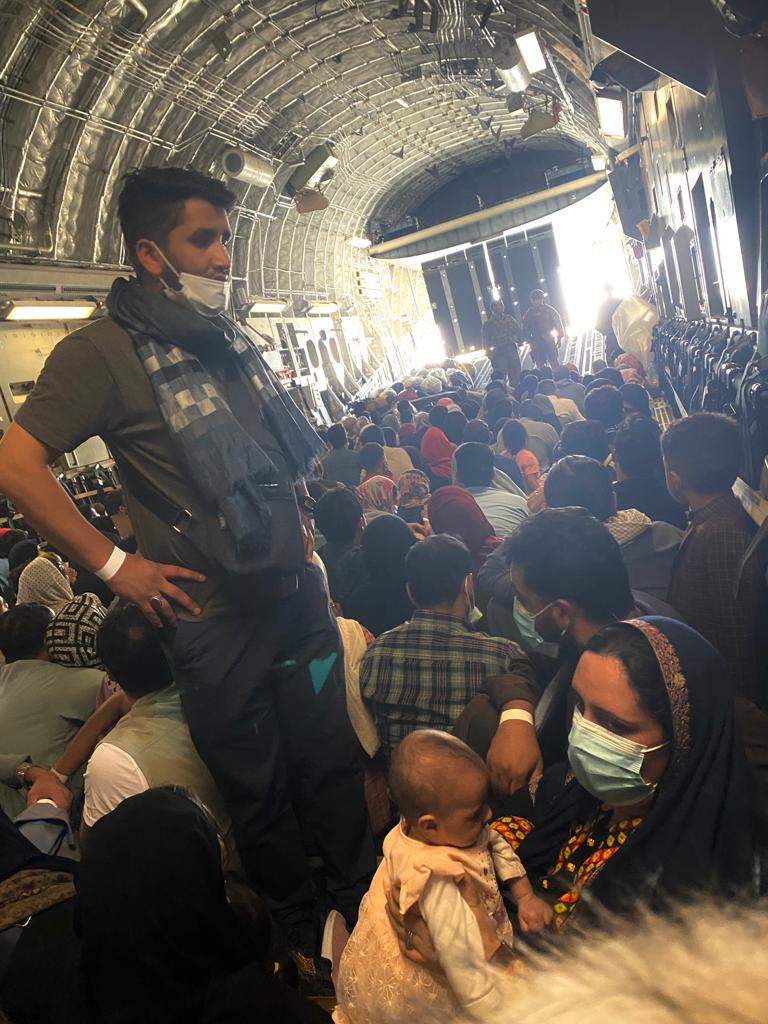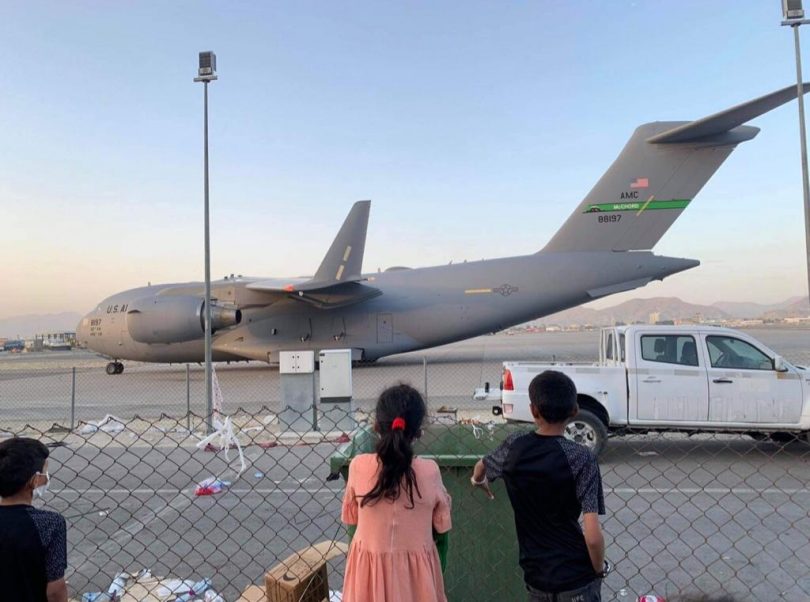By Madiha Gomaa
Boston University News Service
Note from the editor: In this particular piece, the Boston University News Service has approved the use of anonymity for the story’s main source: a refugee recounting her journey to the United States during the military’s withdrawal from Afghanistan in August, 2021.
This is not standard practice at BUNS, but we respect the safety and wishes of the woman who spoke to Madiha Gomaa regarding the experience of her and her husband.
Months following the fall of Kabul, sitting in the lobby of Courtyard Marriott in Coolidge Corner, a 25-year-old Afghan woman was ready to tell her story. For her, a recent refugee who wished to remain anonymous for the safety of her and her family, the last few weeks had been a trek.
For her, back in July, life seemed on track. In an interview on Nov. 4, 2021, she described living in Kabul’s Taimani neighborhood, her recent marriage, and the fact that she was only two semesters away from earning a master’s degree at a nearby university. Then, less than a month later, everything changed.
In August, 20 years after the U.S. and Afghan forces drove the Taliban out of power, installing a new government while facing constant insurgency, the militant group returned. In rapid succession, the Taliban swept across major cities throughout Afghanistan, blowing past any semblance of the country’s government forces, two weeks before the U.S. was set to complete its own troop withdrawal.
“We knew that the Taliban were present near the country’s borders and near provinces … [but] we never expected them to take over Kabul,” she said in the hotel lobby, where she, her husband and other refugees were staying temporarily.
While in Kabul, as militant forces approached, she said, she knew both her husband and herself might be evacuated, as her husband had worked with the U.S. State Department, and the special immigrant visa (SIV) that he applied for a couple of years ago qualified them for evacuation.
At the time, as the Taliban moved in, the U.S. was evacuating American citizens and special immigrant visa holders. Many Afghans who worked with the American government and American agencies were desperate to leave the country, fearing they would be targeted and face retribution from the group.
Anticipating a quick exit, she said she went to the bank with her brother-in-law to withdraw her savings, but the situation was worse than expected. As Taliban troops swept across Kabul, she said, people stayed home from work. Almost all places were closed, including the bank.
“We just turned the car back to home,” she said. “We never left the house ever since that day. Only my father-in-law would go out to pick up some groceries and come back right away.”
Soon, as the Taliban gained control of the city, she said she stopped going to college after, as bans on women attending school or working went into effect.
For almost two weeks, as the takeover wrapped up and evacuations at Kabul International Airport continued, she described twice attempting to go to the airport. The first time, she and her husband went on their own, but it was impossible to get in. Adding to the chaos, she said, were people who went to the airport with only their ID cards, thinking that would be their ticket to get on an airplane.
“Everyone was there; you must’ve seen the videos of people clinging to airplanes and falling off,” she said. “That did happen.”
But by the end of the two weeks, an announcement came. The U.S. Embassy informed them that two buses were ready to take them to the airport.
She recounted how she went to say goodbye to her family, including her mother and a brother who themselves would be leaving for the Czech Republic, not knowing if they would ever be reunited.
Meanwhile, she said, her younger brother, due to restrictions, could not travel with them, as he was 20 years old. This, in turn, led to his father staying with him, unable to leave him behind in the city.
But the eventual bus trip, she said, was not what it seemed.
“The day [came], we were on a fully-packed bus leaving Kabul,” she said. “The U.S. Embassy told my husband that the bus will take us directly to the airport.”
Instead, she said, the bus stopped suddenly in an unknown location. Soon, she said, it was quickly surrounded by what she described as a Taliban militia. Looking back, she said she thinks the bus driver intentionally delivered the group to them.
From there, she explained, the scene turned frightening, as the militia started beating men who didn’t have an embassy card, which was required to get inside the airport, holding passengers for almost seven hours.
“They had us sitting on the streets,” she said. “We were terrified of what might happen next. It was a scary night. There was a pregnant lady with us who started bleeding from fear. I think she might’ve lost her baby.”
Many hours passed, she said, before the group heard that the American troops contacted the militia, telling them to release the passengers or face an attack on their location near the airport.
“We heard the sound of the explosions,” she said. “[The] Taliban got scared and ran away, leaving us there. Everyone started running too. We didn’t know where to go, we didn’t even know where we were. It was 2 a.m., it was dark … no one but us on the road.”
Eventually, she said, they found a taxi and were able to travel home, ending what she described as “the worst night in our life.”
The next morning, she and her husband were having breakfast when the U.S. Embassy called them. Again, buses would be taking them to the airport, but they could only take clothes packed in plastic, see-through bags.
This time, they made it to the airport safely but had to leave their plastic bags behind, as there was no room on the plane.
“On Aug. 28, we got on a military aircraft that had no chairs,” she said. “It’s hard to tell how many of us were aboard, maybe hundreds. People were sitting on top of each other.”

The refugees were flown to Doha, Qatar, where they stayed for six nights. From there, the odyssey continued, first to Germany, then to Philadelphia, then, finally, to Texas where they stayed in a refugee camp for two months.
“We lived in tents in a desert near New Mexico,” she said. “There were about 13 families in one tent. I couldn’t sleep well because of the hot weather and insects.”
The couple was eventually resettled in Massachusetts, part of the 900 refugees who initially came to Mass. following the U.S. withdrawal from Afghanistan, according to government figures obtained by the Associated Press in September.
The Refugee and Immigrant Assistant Center (RIAC) and Kataluma, a nonprofit organization that works with refugees and asylum-seekers, managed to get the Coolidge Corner’s Courtyard by Marriott hotel on board.
The hotel temporarily hosted many families who arrived in Brookline in early October until the RIAC and Kataluma managed to find them houses and shelter to move in. The couple spent two weeks in the hotel before moving on to a host home in Concord.
Meanwhile, the 25-year-old said she discovered she was four months pregnant, a condition she wasn’t aware of until arriving in Brookline. Up until that point, she said she thought the pain experienced during her time in the camp was due to general fatigue and lack of sleep. Yet, after everything and seeing a doctor, she said the child was doing well.
Now, the couple is focusing on adjusting to American life — a society they had hoped to be part of when they applied for the SIV two years ago. Far from how they imagined coming to the United States, she said she and her husband are here now and, most importantly, safe.








